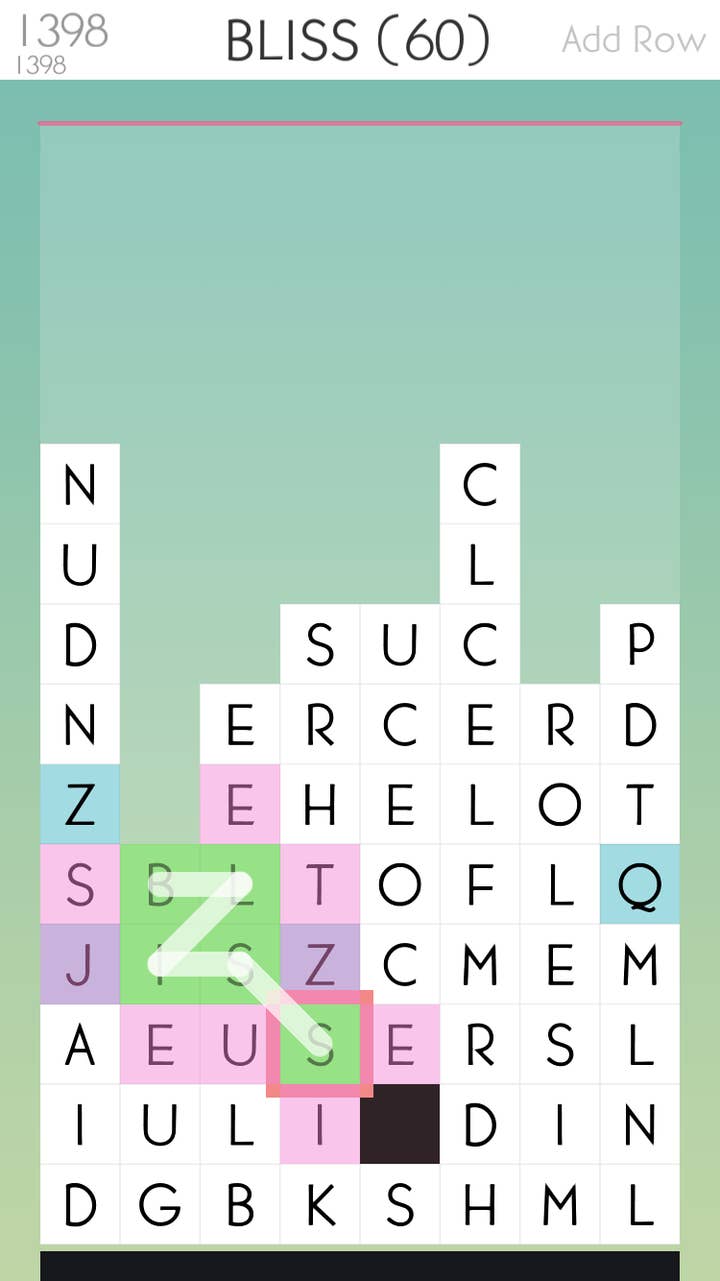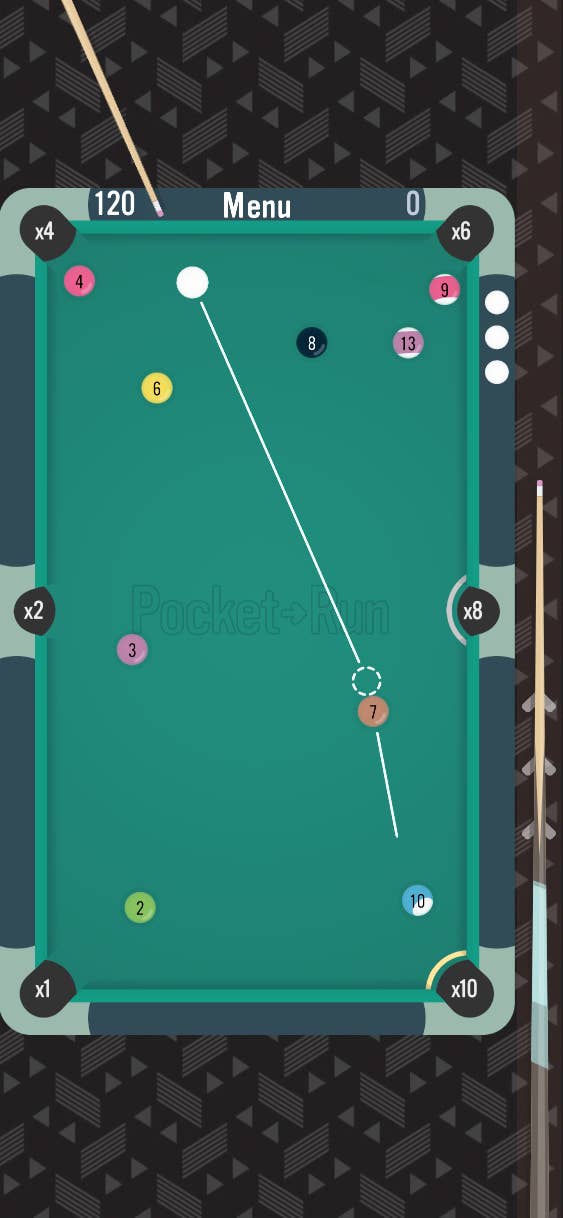Casual free-to-play without the competition
Pocket-Run Pool developer Zach Gage makes quickly cloned games in well-established genres for mass market audiences, so why isn't he drowning in a red ocean?
When Zach Gage first put together a prototype for his 2011 word game SpellTower, he didn't much care for it.
"When I played it, I just found words and the blocks fell down and I thought, 'Eh, this is kind of boring,'" Gage told GamesIndustry.biz this week, adding, "I was really not somebody who enjoyed word games at all. But all my friends who loved word games said, 'Oh my god, this is amazing, you have to work on it.' And I thought it was really kind of a failure when I was working on it. It was shocking to me my friends were playing it and telling me how good it was."
Gage said at the time that he preferred games like Advance Wars, Final Fantasy Tactics, and Halo 3, "deeply mechanical, games with a lot of moving components you had to think about all the time to be able to make the best move."

"SpellTower to me didn't have those things. It was just, 'What's the word I can find? Ok, I'll find it.' But for people who love word games, there's a depth to the strategy and decision-making that exists in finding words, choosing what you're going to spell, rearranging letters to allow for different kinds of things in the future. And they saw that immediately, because that was their jam... For me, that was like, 'Who cares.' But for someone who likes word games it was, 'Oh my god! Here's this weird way I can interact with words, and that's enough for me to get really excited!'"
Having been convinced that SpellTower was onto something, Gage began to polish it for release. He talked to word game fans about which titles they liked and why. He played a number of word games himself to figure out what the appeal is. He added a few more strategic mechanics to round out the gameplay and make it more appealing to his fellow non-word game fans.
"I think I got addicted to that process of working in this field that had a bunch of unknown constraints I would have to discover and work with," Gage said of the process.
Since that time, Gage has had a successful string of games that offered similarly novel approaches to well-worn genres. He made another word game called Typeshift, created two Solitaire apps in Sage Solitaire and Flipflop Solitaire, and offered a new take on chess with Really Bad Chess, all of which offer immediately clear new approaches to the source material. For instance, Really Bad Chess scales its difficulty up and down not by changing the quality of the AI opponent, but by changing the pieces each team begins the game with.
"When you're young and you want to be an artist, you look at things and you go, 'These people don't know anything! I'm right, the things I love are great, and all these other things are crap'"
The next pastime to get an adaptation from Gage is pool. Next week will see the worldwide iOS debut of Pocket-Run Pool, an arcade-style pool game where players get different amounts of points depending on which pockets they sink the balls in. Having gone through this process of updating tried-and-true games a number of times, Gage said he's no longer surprised by how appealing they can be, or how much depth their designs can hide.
"At this point, I have a respect for these other genres I didn't have initially," Gage said. "When you're young and you want to be an artist, you look at things and you go, 'These people don't know anything! I'm right, the things I love are great, and all these other things are crap.' That's kind of a required sentiment to be an artist, because you have to go after something really hard. But now that I've done it for a while I feel like, 'Is there something I hate that I've hated my whole life? That's so exciting! Now I can learn about it and do this thing!'
"But the thing I really see over and over again that has been extremely helpful to me is that when you work in a lot of these genres--especially the genres related to pre-video game literacies like newspaper games, dice games, or card games--a lot of these genres haven't really made the leap into the digital world at all, at least not in a form that is really legible to people who played the non-digital version."
For example, there are plenty of new video game card games, but they're typically something as complex and involved as Hearthstone, which is effectively alien to someone who is used to playing all their card games with a standard deck of cards. Gage said there really aren't many new video game card games that actually still feel like Solitaire or Poker.

"So one of the things that's been really cool is when you make a game that looks and feels like Solitaire, you reach an audience of people who care about Solitaire, who mostly play Solitaire, who probably have not been exposed to all these innovations that have come through in video games," he said. "So you can do simpler things. You can explore more subtle aspects of game design and bring them to these worlds."
That speaks to one of the reasons Gage has enjoyed exploring this particular groove of game design: He finds it rewarding to open people's eyes to what video games can be.
"I don't really care to talk to most of the people who play video games all the time," Gage explained. "They already know what video games can be. They already know all these weird, magical things people can do. And it's great when they like the games, but the people I'm most excited to talk to are the people who have never played video games, who are not really interested in video games, and think the things I'm creating are entirely new experiences that are bringing them something they've never seen before in a way that's really comfortable to them."
Of course, there's plenty of competition for non-traditional gaming audiences, just as there has been for over a decade now. But Gage thinks the competition is taking a decidedly different approach to engaging these people.
"I want your grandma who plays gin rummy to understand there's actually an entire universe of things that are like the thing she really enjoys, and she can be a part of that"
"There are a lot of people who are trying to talk to the groups of people I'm trying to talk to now," Gage said. "The casual games market has really moved into that space pretty aggressively, but I think the difference is a lot of those casual games aren't really acting as vehicles for education. As much as new and challenging things are going on in Candy Crush, the people who make Candy Crush are quite happy if all you know about video games is Candy Crush, and if they can keep a bunch of information from you so they can exploit you just a little bit, that's even better for them.
"But for me, I want video games to be this really wonderful, compelling medium. And part of having video games be an important medium is giving a level of understanding about video games to everybody, on a cultural level. I want your grandma who plays gin rummy to understand there's actually an entire universe of things that are like the thing she really enjoys, and she can be a part of that. There are ways for her to be a part of that and learn about that. I want to get to a place in culture where everybody has a basic set of literacies to understand what games are, how the components of them work, what makes them deep, and how they can enjoy them or not be exploited by them."
That's one of the reasons for the business model Gage has settled on for his games. While he started with a simple pay-once premium model for his titles, Gage has since moved to an ad-supported free-to-play model where players can purchase new content or features and remove the ads if they wish.
"To me it feels almost like the fruit's just laying around in the field and I can just wander around and pick it up. I'm almost not competing with anybody, which is really weird to me"
"I really love the idea that anyone can play my games," Gage said. "There are a lot of people on the App Store who don't have credit cards tied to their account, or are too young to have credit cards, or just don't spend money on games because that's not their cultural standpoint. If you're a grandma who's been playing gin rummy for free your whole life, maybe going and buying a bunch of digital video games is not the first thing you want to do. But if they're available for free, maybe it's something you might do."
The other reason for free-to-play? It undercuts cloners, something that became a concern for Gage after Ridiculous Fishing, the mobile hit he made with Vlambeer and Greg Wohlwend, ran into problems with look-alike apps. Seeing Wohlwend's next game, Threes, cloned into the more commercially successful 2048 further pushed Gage away from using premium models for his games.
"I've hit a point in my career where any time I put anything out people clone it right away, and it's a really huge problem," Gage said. "I basically cannot make a premium game unless it's got so much content it's difficult to clone. But my games are these small, intricate little systems that are difficult to come up with, but easy to replicate. So if I don't make things free, people will just put out a free version of my game and throw ads in it, and that will be the version that takes off."
Surprisingly enough, even with the cloners, the Candy Crushes of the world pursuing the same non-traditional gamers, and no shortage of App Store hits when you search for word games, Solitaire, chess, or pool, Gage sees himself as harvesting the lowest hanging fruit possible.
"To me it feels almost like the fruit's just laying around in the field and I can just wander around and pick it up," he said. "I'm almost not competing with anybody, which is really weird to me."
He added, "If I was in a world where there were a lot of people designing entirely new pool variants I would be worried, and I would probably have to do the research. But the reality is very few people are designing new Solitaire variants that are not, like, RPGs. Very few people are designing new pool variants, new chess variants."
